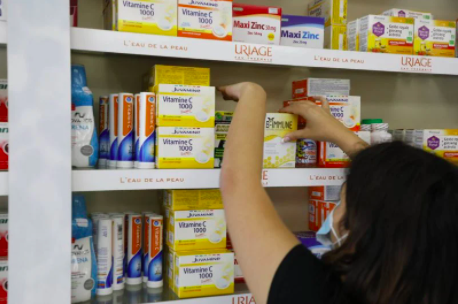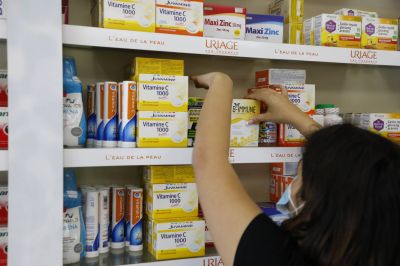
Medicine displayed on the shelves of a pharmacy in the Beirut. (Credit: Marc Fayad)
While they have been taking chronic diseases medications for years, including for diabetes and hypertension, Claude* and her husband had no choice but to bring their medicines from abroad, at a high price. That is because Lebanon is still beset by shortages, against the backdrop of the partial or complete lifting of subsidies on a large number of products, since Banque du Liban decided to limit the dollars granted to importers of pharmaceutical products.
“We spent 1,000 euros on medicines in France. We even bought some for my brother-in-law who has heart problems. These products have not been available here for months. Do you realize that we could have made ends meet for six months with 1,000 euros here?” Claude said.
Jamal*, 70, is permanently in need of anticoagulants for his treatment, which he has hardly been able to find since the beginning of the crisis. “My medication is still subsidized. It costs LL135,000, if available. It has been out of stock for six months in a row,” he said. “When available, the pharmacist does not allow me to buy more than one pack per month.”
Despite the crisis, Jamal has been able to get his treatment without interruption, after buying his medications from abroad and because he has been able to store the packs he had picked up here and there. “A friend of mine brought me some boxes that he got from pharmacies in the South,” he said.
Chronic diseases medications, such as those used by Claude or Jamal, are still partially subsidized by BDL. But they continue to be difficult to obtain due to funding difficulties, according to Karim Gebara, the head of the pharmaceutical importers’ syndicate.
“Before the crisis, the country needed $70 million a month to import subsidized medications. But the amounts available have fallen dramatically since the crisis. BDL now provides importers with only $25 million per month. Hence, the quantity imported has dropped, which means that the demand exceeds the quantity on the market,” he said.
“We don’t get it at all,” said a pharmacist in the capital. “They deliver us small quantities, especially for cancer and chronic diseases, so it is normal for us to be out of stock.”
“We do not stock drugs, we simply do not have enough,” she stressed, in response to accusations regularly leveled at pharmacists by disgruntled customers. “The importers were waiting for the health minister to sign the new dollar rate to hand us the products,” she explained.
Medication prices are calculated based on this rate for the greenback. It is not always equal to the dollar rate on the parallel market, which explains the possible losses. “I hear the importers, they are not running a charity, and neither are we,” the pharmacist said.
The pharmacists almost went on strike because of the lack of medicines. They finally stepped back, head of the pharmacists’ syndicate Joe Salloum told L'Orient-Le Jour. “We have started to receive medicines again, but the quantities are insufficient,” he said.
Gebara also explained that the Health Ministry is trying to manage its $25 million monthly budget as well as possible, in agreement with the importers. “Every month, medication importers submit lists of subsidized products to be imported. The Health Ministry then selects the products that can be imported, in a way that does not exceed the budget. The products that have a locally manufactured equivalent are not subsidized,” he said.
According to the ministry, the $25 million per month is divided between the different categories of subsidized medications. For example, $17 million is spent on cancer and life-threatening diseases treatments, which are still 100 percent subsidized by the government. The remaining $8 million are divided between chronic diseases medication imports ($5 million) and local production of generics ($3 million). This is because, since Tuesday, Parliament has passed a law to support the Lebanese pharmaceutical industries.
While subsidies for imports were reduced to encourage the production of local generic medicines, the ministry plans to use the saved amount to buy more cancer drugs or production equipment, which will be given to pharmaceutical plants.
In the wait for these solutions to be effectively implemented, cancer patients continue to have difficulty accessing treatment on an ongoing basis. Christine*, 42, goes to different pharmacies every month to get her mother’s breast cancer medication. But her mother missed her treatment for two months due to shortages.
“She got a dose in December. Then nothing in January and February, because the medication was not available and there is no substitute. It was only in March that we were able to get it,” she said.
“A discontinued treatment will affect its effectiveness. We don’t know how to replace missing doses because we only get one pack a month. It is out of the question to buy this medication abroad. A bottle costs 2,000 euros and we can’t afford it,” she added.
Determined not to deny her mother the treatment, Christine contacted the importing company last month. “We moved heaven to get the importer’s number, because we were afraid that the medication was being stockpiled by suppliers. We were told it was unavailable. It was only in March that it became available again,” she said.
Is Lebanese generic medication a solution?
Christine’s mother, who also suffers from chronic illnesses, needs a second medication, also unavailable in the country. “We heard about a Lebanese generic that could replace her second treatment. But we don’t trust the local production, we don’t know if it is reliable,” Christine said.
It has been a while since Claude and her husband have opted for local generics. “The whole world uses generic drugs. They are as effective as the well-known brands. We have good laboratories here, we must trust them and encourage them, instead of complaining. Plus, they are cheaper,” Claude said.
Despite some patients’ reluctance, Abiad is banking on the manufacturing of Lebanese generic medicines, hoping to lower the country’s medical bill and put an end to shortages. “Some foreign pharmaceutical companies no longer operate in Lebanon due unpaid bills dating back to more than a year ago,” Abiad told the journalists on Tuesday. “Our local production is of very good quality. Lebanese pharmaceutical factories have high standards. Our medications are exported to the Gulf countries and Europe,” he added.
“We will now allocate $5 million a month for the purchase of production materials for local factories. We will stop subsidizing any medication that has an equivalent made in Lebanon. The Lebanese production needs less subsidies and is cheaper for buyers,” the minister explained.
Bertha Abou Zeid, deputy head of the Syndicate of Pharmaceutical Industries, said the local industry “can meet 60 percent of the market demand.” “We are expanding, but we just need to be supported,” she said.
While imported medications are clearly below market needs, and the subsidization of the local industry will take time, drug shortages are not about to end. Yet, for the patients, every day counts.
*The names have been changed.
This article was originally published in French in L'Orient-Le Jour.
